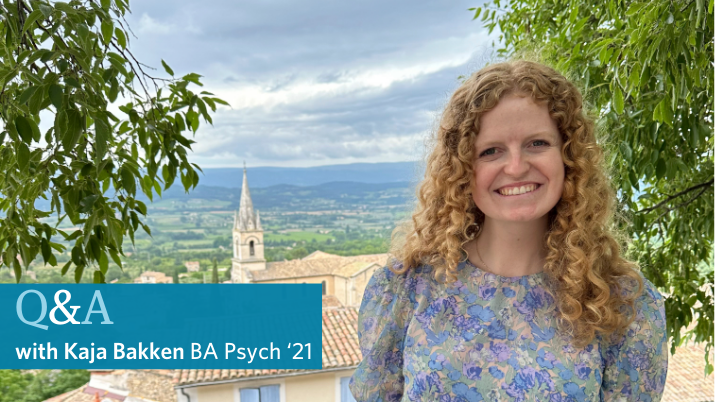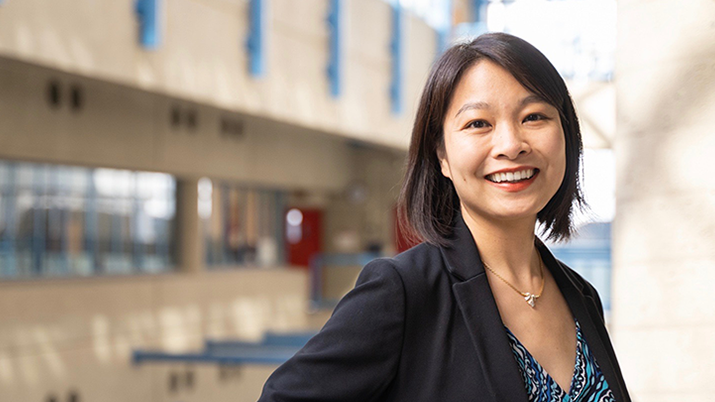

Kaja Bakken (BA ’21) is a 2nd year MA student in Clinical-Developmental Psychology at York University.
Kaja Bakken’s deep compassion for others motivated her to pursue graduate studies and conduct her own research in clinical psychology. After earning her BA in Psychology in 2021, Kaja gained valuable experience working with several research labs in psychology and psychiatry, which helped her clarify her research interests. She is currently exploring the link between daily emotion regulation strategies and mental health, aiming to promote well-being among young adults.
Read a Q&A with Kaja on her UBC experience, the value of a psychology degree, and her tips for those looking to pursue a career in clinical psychology.
Why did you choose to study psychology at UBC?
I’ve known I wanted to work in a mental health field since early high school, and knew that studying psychology at UBC would give me many opportunities to explore different career paths within the field. Studying psychology at UBC led me to explore my passion for research and clinical work, ultimately leading me to clinical psychology so I’d say it worked out!
“Studying psychology at UBC led me to explore my passion for research and clinical work, ultimately leading me to clinical psychology so I’d say it worked out!”
When you were a student, was there anything or anyone who inspired you?
So many people inspired me while I was a student! We are so fortunate at UBC to have outstanding professors and staff who are willing to mentor undergraduate students. Additionally, working with graduate students inspired me to pursue graduate school and my own research interests. Lastly, witnessing my family and friends grow and discover the paths right for them inspired me to take risks and explore.
In your experience, how does the value of a psychology degree translate into the real world?
A psychology degree teaches you how to think critically about the world around you and to understand why and how people think and behave the way they do. These skills are essential for any career, and more importantly, help you navigate the world with understanding and compassion for others.
“A psychology degree teaches you how to think critically about the world around you and to understand why and how people think and behave the way they do. These skills are essential for any career, and more importantly, help you navigate the world with understanding and compassion for others.”
How has UBC shaped your career trajectory?
I’m so grateful for my time at UBC and know it will have a lifelong influence on many aspects of my life. UBC provided me with the opportunity to learn and develop essential skills through a variety of avenues, including course work, research opportunities, leadership programs, jobs, and extracurriculars. More than any specific skills, my time at UBC has shaped my career trajectory by encouraging me to pursue curiosity and excellence. It’s these traits, along with the supportive relationships I developed along the way, that have led me to where I am today.
Are you working on any new research that you’re excited about?
Yes! I’m currently working on my thesis, which aims to investigate the relationship between daily emotion regulation strategy selection/efficacy and mental health and well-being among emerging adults. I’m really excited about this work and the implications it has for advancing well-being for young adults!
What advice would you give to students interested in pursuing clinical psychology?
Ask questions! I could tell you exactly what helped me, but everyone has a different story. Learning from everyone around you – your peers also interested in clinical psychology, graduate students, clinical psychologists, professors – will provide you with invaluable advice in determining what works best for you. I worked with multiple research labs in between my undergraduate degree and beginning graduate school, and taking that break was essential for understanding my research interests, what I wanted in a graduate program, and starting graduate school well-rested. It was through many discussions with trusted mentors, family, and friends that I grew into the researcher (and person) I am today. My other piece of advice is to prioritize your overall well-being and relationships. It’s easy to get caught up in filling your schedule with things that prepare you for the next step that you miss opportunities that lead to a holistic and joyful life now. Enjoy each stage for what it is, not where it will take you.
“My advice is to prioritize your overall well-being and relationships. It’s easy to get caught up in filling your schedule with things that prepare you for the next step that you miss opportunities that lead to a holistic and joyful life now. Enjoy each stage for what it is, not where it will take you.”


